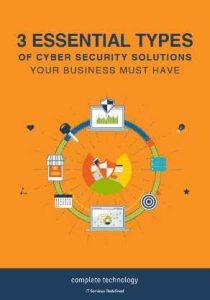Given the endless news about malware, phishing, and other cybercrime today, you might have also heard about the dangers of the dark web. But what exactly is the dark web? If you surmised that it’s a hidden place on the internet where cybercriminals lurk, then you’re partly correct.
The dark web is a hidden part of the World Wide Web only accessible through a special web browser. It is not to be confused with the deep web, which includes pages that are undiscoverable by search engines, such as intranet pages, email inboxes, cloud drives, and dynamic pages. For the most part, the deep web isn’t dangerous. The dark web is deadly.
Here are a few reasons why you should concern yourself with the dark web:
Your data is at stake
The dark web allows people to remain 100% anonymous, which is why cybercriminals use it to sell dangerous items such as weapons and illegal drugs. However, the market for leaked and stolen corporate data and credentials is growing rapidly as well.
Every day, surfers of the dark web see advertisements for the sale of user credentials, credit card details, and scanned documents containing personal information, all of which may be leaked to the dark web by a vengeful ex-employee or any hacker. In extreme cases, so-called “Hacktivists” release this data to damage your company’s reputation or advance a political message.
Sensitive data such as employees’ and customers’ personal details, and company secrets are very valuable on the dark web. US passports and medical records go for as much as $2,000 a pop. Even a user’s login credentials are worth $200.
Your small business is affected
Some small- to medium-sized businesses (SMBs) think they’re immune to cyberattacks because they don’t have anything of value to hackers. This couldn’t be farther from the truth. For years, SMBs have been preferred targets because of their DIY or low-budget cybersecurity.
What’s more, the market for corporate data will continue to thrive on the dark web, as the low risk of getting caught makes it an attractive place for cybercriminals to earn money.
Unfortunately, many organizations only take action after they learn that their confidential information has appeared on the dark web. Although that can curtail the extent of a breach, some basic proactive steps would have prevented the necessity for any data recovery or reputational damage control.
What can you do about the dangers of the dark web?
As soon as you find out your data has appeared on the dark web, you should alter as much as possible (i.e. usernames and passwords) and put a freeze on bank accounts and credit scores. In terms of proactive action, here are a few tips to consider:
1. Prohibit Tor and other dark web-related software
Tor is a web browser built to access the dark web and if no one in your network has access to it you’ll make it harder to smuggle data out. State in your employee handbook clearly that the use of dark web software is prohibited.
You can also use software that blocks software or websites that aren’t related to a user’s work. In case these rules are broken or bypassed, implement the necessary sanctions.
2. Limit access to sensitive data
Access management technologies such as Azure Information Protection (AIP) and Microsoft Intune restrict access privileges to your most important data. For example, AIP lets you classify data based on how sensitive it is, which means IT administrators can quickly add or remove privileges to entire groups.
Intune lets businesses manage mobile devices that employees use to access corporate data and applications. You can disable access to your sensitive data if users are not connected to your corporate network. Mobile devices can also be locked down to a preset list of apps to prevent malware from making its way on employees’ smartphones and tablets.

Download our free eBook!
Learn more about why defending your network is getting harder every day by reading our free eBook: 3 Essential types of cyber security solutions your business must have
3. Implement multi-factor authentication (MFA)
Password theft is one of the most dangerous cyberthreats today, but it can be easily avoided with MFA. This technology uses more than one means of identity verification, such as a one-time smartphone code, or a fingerprint or facial scan. This way, even if cybercriminals get ahold of a user’s password, their login attempts will fail unless they also have the user’s mobile device.
4. Use a dark web monitoring service
Websites such as haveibeenpwned help you check if any corporate emails have been breached. Have security experts monitor the dark web to know if any personal or company information is showing up on illegal forums or marketplaces. Change passwords in case of a data breach attack.
Your business doesn’t have to worry about the dark web when you partner with Complete Technology. Our proactive management services will monitor your systems 24/7/365 and protect your systems from all cyberthreats. With us, you enjoy enhanced uptime and predictable IT spending. Interested? Get your FREE Consultation today.







